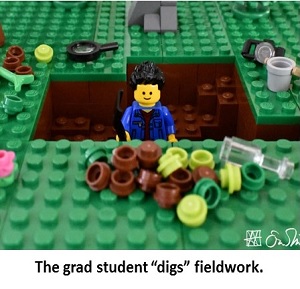Advice for Grad Students
 Meet Anthy. You may have heard of her famous cousin Abby, a go-to for all things lifestyle and relationship related; well, good advice giving seems to run in the family. Praised as an anthropology graduate student life saver, Anthy has consolidated the collective wisdom of current Western anthropology grad students to bring you expert advice about the ins and outs of graduate school.
Meet Anthy. You may have heard of her famous cousin Abby, a go-to for all things lifestyle and relationship related; well, good advice giving seems to run in the family. Praised as an anthropology graduate student life saver, Anthy has consolidated the collective wisdom of current Western anthropology grad students to bring you expert advice about the ins and outs of graduate school.
Dear Anthy,
HELP! My friends and I are just starting out in the anthropology graduate program, and while we are enjoying every minute of it, there are some feelings of stress and confusion floating around. Can you help us out with the following questions? Thanks Anthy!
Sincerely, Keener Ken
Dear Keener Ken,
I’d be happy to answer your questions! They are organized thematically below.
Sincerely, Anthy
FIELD WORK
 Dear Anthy, My project involves field research, and to be honest, I am absolutely terrified! Do you have any advice for preparing for the field? What happens if when I get there, my research is not even relevant to the actual situation?!? Also, do you have any tips for conducting interviews? How can I best prepare for them, and what do I need to consider before the interviews? Sincerely, Field Phobic Phoebe
Dear Anthy, My project involves field research, and to be honest, I am absolutely terrified! Do you have any advice for preparing for the field? What happens if when I get there, my research is not even relevant to the actual situation?!? Also, do you have any tips for conducting interviews? How can I best prepare for them, and what do I need to consider before the interviews? Sincerely, Field Phobic Phoebe
Dear Field Phobic Phoebe, Ah yes, “the field,” anthropology’s pride and joy! This question reminds me that our beloved “field” is a big topic, so let’s split this answer up into a three-parter.
PREPARING FOR "THE FIELD"
- Go into the field with an open mind, and always have a back-up plan in your pocket if initial plans fall through. While this may require more planning, it is better than having nothing to write for your thesis!
- Be prepared to record information about anything and everything. While initially you may not think something will be useful to you, it could be a lifesaver in the end. Whether it is socio-cultural interviews or archaeological excavation, try to save and record all information while in the field, as you may want to come back to it after, or someone else may need to use your field notes for their own research.
- Make sure to learn about more than just your intended research target by reading broadly. You will find this particularly helpful if you run into the exciting possibility of your original research questions being completely irrelevant once you leave your graduate office.
- If your research involves travelling abroad or to a remote area, look into the available technology (i.e. internet, cellphone). This will be important for keeping in contact with your pals and family, but also so you can reach your supervisor for advice and status updates.
- On that note, before you leave for “the field”, try to establish a rough check-in schedule with your supervisor. It’s a good idea to establish a half-way point, where together you can assess where you are at, and how you should be moving forward with the rest of your field time.
- If you are going abroad, make sure to look into the requirements of research/student visas, well in advance. If your research is in archaeology, find out what licences/permits you’ll need to break ground and collect data abroad. These things take time and if you leave it to the last minute you won’t be able to get very far with your research stuck in a customs office.
- While conducting archaeological fieldwork, chances are you won’t be working alone. Be prepared to work alongside other people whose personalities or ideas clash with your own. When you’re in the middle of nowhere, you must be able to put conflicts aside so you can be productive as a group. There is no "I" in archaeology.
- Chocolate is essential to any field work. Bring some!
CHANGE IN RESEARCH DESIGN
If things do change from your initial research question, remember that one of the best things about anthropology is that we get to work with people. I know I’m not predictable, so how can we expect others to be? If you find that what you want to talk about is not necessarily what your participants want to talk about, that’s okay. Here are some tips if you find yourself in this situation:- First off, breathe, and maybe cry a few tears if you need to. After all, you did spend a lot of time reading for this!
- Assess your situation. What are the barriers that are preventing you from your orignal plan? Make a list. Can you overcome these barriers? If not, can you create a new plan of action that works around them?
- Contact your supervisor and seek their advice. Don’t forget to also reach out to other colleagues, research participants, faculty etc. for their input, too!
- If you are still stuck, take a step back and look at what you do have information on. Maybe you’ll find inspiration in a new direction that you haven’t given much attention to.
- Just remember that the situation you encounter in the field doesn’t need to fit into your research topic, your research topic needs to fit the actual situation. Be flexible!
CONDUCTING INTERVIEWS
- People are more likely to participate in your research, if you have institutional support that they recognize. If you are going to another country, you can reach out to a university or relevant organization there, to seek their seal of approval for your project. This can also give you more credibility, and make you more trustworthy among potential participants.
- Prepare questions for the interviewees and share them with your colleagues for their feedback. While it is important to develop a large list of questions in advance, remember to be flexible and to add and remove questions based on what you are learning in your interviews.
- Don't plan to start interviews on day one. Take some time to get settled. But do keep notes of what you do every day in a diary or bullet list – just write. Don’t worry about language or grammar.
- Don't shy away from (or feel bad about) social situations! While you may think that going out to shoot some pool is “unproductive,” building relationships is key to good research.
- When looking for people to participate in your research, go to the places and events that are relevant to your topic. If you want to study U.S.-Cuba relations, why not hang out outside the U.S. Embassy while you are in Cuba?
- Don't express any strong opinions about political issues (especially if this is a contentious subject) – remember you are there to learn how and why people think the way they do, and not to impose your opinions on them.
- Some interviewees are nervous, so it might be best to loosen them up a little bit with small talk. Others may be super busy and just want you to get through the questions quickly. Rely on your judgment to differentiate, and ask your questions accordingly.
Sincerely, Anthy
SUPERVISOR-STUDENT RELATIONS
 Dear Anthy, I feel obliged to undertake the research project and use the theoretical approach that my supervisor wants me to, but I don’t think it is the right fit for me. I want to confront them about this issue, but I feel as though it will result in a major disagreement. What should I do?
Dear Anthy, I feel obliged to undertake the research project and use the theoretical approach that my supervisor wants me to, but I don’t think it is the right fit for me. I want to confront them about this issue, but I feel as though it will result in a major disagreement. What should I do?
Sincerely, Shy & Ashamed
Dear Shy & Ashamed, Believe it or not, this is a common occurrence in graduate programs! While there are many approaches you could take, the best way to tackle this problem is to actually have the conversation you may be dreading. Better earlier than later! Also try some of these other tips:
- Remember that no supervisor wants their student to fail and that communication is a two way-street. If you feel that your supervisor hasn’t understood you or you’re not sure you’ve understood them, ask for clarification.
- Before talking to your supervisor, and for all discussions of research direction, try your best to come prepared and acquire the necessary background information.
- When talking to your supervisor, use “I” statements, and avoid blaming. (e.g. “I am wondering if you had a chance to look over the project proposal/ methodological approach I developed. I am feeling pressure to get more work done on that”).
- If they suggest an alternative project or methodological approach, consider asking why. When considering theoretical or methodological approaches it can be easy to be dismissive of new approaches. Try to think of the advantages of different approaches before making a final decision. Ask yourself: What does the proposed approach offer me? Remember that your supervisor's job is to make you think, and to make you better at it!
- Try not to take things personally. Remember that a lukewarm response to a particular research approach is not a reflection of how your supervisor feels about you as a person!
- Don't isolate yourself, talk to someone you trust. A troubled student-supervisor relationship can be a major source of stress for students. Having an avenue of support is crucial. You can confidentially ask for advice about the student-supervisor relationship from the Graduate Chair or any faculty member that you feel comfortable with. I am sure that any of them would be happy to help. Also consider talking to other students in the program about their experiences with this issue!
TEACHING ASSISTANT RESPONSIBILITIES
 Dear Anthy, I've just started as a Teaching Assistant for an undergrad course. Although I am familiar with the content, I really don’t feel qualified to be guiding these students. They are all very bright, some of them are even older than I am. I feel very unprepared! Is this normal?
Dear Anthy, I've just started as a Teaching Assistant for an undergrad course. Although I am familiar with the content, I really don’t feel qualified to be guiding these students. They are all very bright, some of them are even older than I am. I feel very unprepared! Is this normal?
Sincerely, New Teacher Ned
Dear New Teacher Ned,
- First, I highly recommend you sign up for the Teaching Assistant Training Program (TATP). This program offers very useful resources and tips to make both your teaching experience and your students’ experience more enjoyable and productive.
- Don't be afraid to approach the course instructor because teaching is an important task and you must be confident in your role. Meet before classes and/or tutorials and go over that week’s material to ensure you are on the same page as the instructor... literally.
- You can also ask the professor of the course about the principal concepts, theories, or ideas of the course, so you can start reading the fundamentals and not just the items on the reading list. At the same time, it’s worth remembering that you are there to guide the students through the course rather than teach them all the material covered in class!
- Always make sure that you are working within the guidelines set out by your union contract. The university and your local union (PSAC Local 610) have a collective agreement. As a member of the union, you should only be working a certain number of hours.
- You can always ask ask your fellow grad students for advice, too. You share a common room with at least three or four other grads, who are always looking for a chance to take a mental break from their studies. If you don’t ask, you won’t receive. So… do it!
Sincerely, Anthy
QUALIFYING EXAMINATIONS
 Dear Anthy, What the heck are "quals"? They sound like a medical procedure! I keep hearing people talk about these and how stressful they are. Are they something I should be preparing for?
Dear Anthy, What the heck are "quals"? They sound like a medical procedure! I keep hearing people talk about these and how stressful they are. Are they something I should be preparing for?
Sincerely, Confused Curtis
Dear Confused Curtis, Qualifying examinations are a key feature of PhD studies in almost any department. If you are not a current PhD student, you have nothing to worry about! While the “quals” or qualifying exams may seem daunting, they are meant to be an opportunity for students to fully explore the research that they are interested in conducting. Some key features of quals:
- They are usually started in the summer of your first year, and completed during your second academic year of a PhD program (ideally by the end of December).
- They provide you with a chance to review the relevant literature prior to conducting field research or analysis.
- They are written papers that describe and/or evaluate certain key themes. These themes often include methodology, theoretical approaches, and a regional question related to your research.
- The nature of your questions is highly influenced by both your, and your supervisor’s plans for your research. When in doubt, always contact your supervisor! You can also talk to students who have completed, or are currently undertaking quals.
If you are a PhD student and quals are creeping up, here are some more tips:
- Think of the value of this activity. If you understand the purpose of quals - to better prepare you to undertake your research - and how they will ultimately aid your research later - by generating material that you can use in the background chapters of your dissertation - they can be much easier to manage.
- Ask around! Ask your colleagues, peers, and supervisors about the processes, timeline, expectations, and common mistakes! While these may be different for different research topics, some general similarities apply.
- Like any assignment, set a timeline and stick to it! Organize yourself by month, week, day, or even hour if it helps you to stay on your timeline. If you are working elsewhere (e.g. like a T.A.) while reading and writing quals, ensure you organize a fair balance, and try not to put the quals second!
- Never read passively! Reading for qualifying exams is not like reading for pleasure! Be sure to always take sufficient notes, however you do that best. You can make notes in the margins of your documents or write an annotated bibliography. You can use highlighters and funny coloured pens, you can also use sticky notes, tabs, etc.!
- During an oral defense, try to stay as cool as a cucumber. You are likely to remember much more, and present yourself more professionally if you are confident in what you have researched and written. You read and wrote those papers, so you know them better than anyone. Don’t underestimate your own abilities!
- If faced with a question during your oral defense that you can’t answer, don’t fret! It is likely that your advisory committee will test the extent of your knowledge. Admitting that you don’t know the answer is not admitting defeat! You can say “That's a really good question. I guess I need to think about that”.
- Consider the benefit of the oral defense! You may be required to answer similar questions in the future: to research ethics boards, job talks, postdoc interview talks, presenting reports to the government, giving testimony, etc. It is important to learn early how to think on your feet, and present effectively and confidently. Even though you might not be looking forward to it, remember that it gives you a useful skill that will help in lots of situations!
GRADUATE STUDENT WRITING
 Dear Anthy, Coming into my graduate studies, I’ve realized that writing is totally different at a graduate level!!! There are different expectations, and I’m even supposed to be writing things like a grant proposal - I’ve never had to write one before, and I have no idea what I’m doing! Is there anything I can do to improve my writing?
Dear Anthy, Coming into my graduate studies, I’ve realized that writing is totally different at a graduate level!!! There are different expectations, and I’m even supposed to be writing things like a grant proposal - I’ve never had to write one before, and I have no idea what I’m doing! Is there anything I can do to improve my writing?
Sincerely, Exasperated Elly
Dear Exasperated Elly,, Do you remember having to learn the ropes of new expectations when you started high school? It’s the same when you move from undergrad to grad school. Expect and embrace the change – it will make you a better writer! Here are a few tips and resources you can access on campus to help with this transition:
- Ask lots of questions! Don't ever be afraid to ask questions, even if you think that they are not important or relevant. Always make sure you know what you’re doing! Sit down with the professors of your courses and ask for feedback on how you can write more effectively, efficiently, and coherently. Ask your professors what their specific expectations are for the assignments. If they are unable to help you themselves, they are likely to know where you can get the help you need.
- You can always ask if your supervisor is willing to look over some of your writing to help you with the changes in style and expectations. When you are writing something important, such as a grant proposal, make sure to have your supervisor look it over before you submit it.
- I will dare to say that the Writing Support Center is 80% of the solution to this problem. It has one-to-one counselling appointments, also seminars and workshops specially designed for graduate students.
- The Writing Resources website contains different events that are happening around campus which are centered on writing, as well as information about writing grants and style guides.
- Find one academic article that is easy to read and written in a style that you like. Read it again without being focused on its content, and try to recognize the general structure of the article: paragraphs, sentences, and words. What kind of structure does the author use to communicate the principal ideas? Try to reproduce these structures in your writing.
FUNDING & FINANCES
 Dear Anthy, I want to apply to bursaries and government funding programs, but I don’t have a clear sense of my research project yet. What advice do you have about grant writing when your research topic is fluctuating as much as the fall weather?
Dear Anthy, I want to apply to bursaries and government funding programs, but I don’t have a clear sense of my research project yet. What advice do you have about grant writing when your research topic is fluctuating as much as the fall weather?
Sincerely, Broke Brooke
Dear Broke Brooke, The reality of grant applications is that the deadlines fall way before your research is conducted! Not to worry, there are many supports and resources for you to think about your research topic and create a strong application. Some of them include:
- Talking to your faculty (supervisor, grad chair) and discuss what is expected of a successful grant proposal.
- Western University and the Department of Anthropology have workshops on drafting successful grant applications, so make sure you attend these!
- Nobody can write a perfect proposal on the first attempt. Write a draft and make an appointment with your supervisor to discuss what needs to improve.
- Through the process of writing your grant proposal, you may discover what you truly want your thesis to be about. Creating an outline is a good way to begin. What are some of the main things you want to look at?
- Practice makes perfect. Even if you draft something that isn’t exactly what you want to research, that’s fine! What you apply to do and what you actually do can be different. You aren’t tied down to your original plan.
Sincerely, Anthy
Dear Anthy,
Thanks so much for your reply on my question, but I’m so upset! I don’t qualify for SSHRC or OGS. How will I be able to do my research without funding? Is this the end for me?Sincerely, Broke Brooke
Dear Broke Brooke,
Don't fret! Many students are in your position. Not everyone is eligible for funding, and even if they are, not everyone gets it. But there are other sources that can help fund your project. While the major funding sources have specific eligibility criteria, there are others out there that don’t have requirements based on citizenship or GPA. Some key ideas about alternative funding sources:- All graduate students are eligible for funding through Western Graduate Research Scholarships, Teaching and Research Assistantships, as well as funds from their supervisors’ grants in some cases.
- Alternative sources target different types of projects, some might be targeted towards a particular study area, some might be based on the type of research, and others might focus on your own personal background. You just need to start looking ‘outside of the box.’ Search for funding related to a main aspect of your research or through specific societies that might be related to your research.
- The Faculty of Social Science Graduate Research Awards Fund is a great place to start. In order to apply, you need to be a full-time graduate student and your research proposal needs to involve primary data collection.
- Society of Graduate Students (SOGS) awards Masters and PhD scholarships once a year to full-time members of the society (All full time students are members!). GPA, research publications, and community involvement are an asset. SOGS also gives bursaries three times a year to full-time members of the society who demonstrate financial need.
- PSAC has lots of funding and bursary options that you can apply for as a member of the Local 610 Teaching Assistant Union. To be considered, you need to be a member in good standing (having signed your blue membership card). Applications are evaluated based on GPA and proven need.
- As a Western student you also have access to Pivot, a database which lists funding opportunities totalling an estimated $33 billion. Pivot allows you to search for funding based on things such as the geographic focus of your research, your research topic, and your level of study.
- If you don't qualify for funding, watching your finances becomes important! You can save some money by shopping for groceries on Tuesdays (10% student discount at select grocery stores), and even apply for hydro compensation with the Ontario Electricity Support Program (grad students qualify because they are under a certain income bracket).
FALLING BEHIND
 Dear Anthy, Why is it that every other student in my cohort has their life figured out but me? I still have no idea how to tackle my research, meanwhile others are already making plans to go into the field! Is there something wrong with me?
Dear Anthy, Why is it that every other student in my cohort has their life figured out but me? I still have no idea how to tackle my research, meanwhile others are already making plans to go into the field! Is there something wrong with me?
Sincerely, Behind Schedule Barney
Dear Behind Schedule Barney, There is only one solution to your problem: You need a plan! Pour yourself a cup of tea, sit down, and make a schedule! Here are some pointers:
- Talk to your supervisor. Once upon a time, your supervisor was a grad student, too. Plus, they are there to help you. So go ahead, schedule an appointment to figure out your game plan. You should never feel uncomfortable asking them questions.
- Look at your original research proposal, what do/don’t you like about it? Get a rough draft made, but keep in mind that almost everyone changes the focus of their research at some point along the way. Your project is not written in stone!
- As an MA student, your third semester should be the time to collect data in the field. By that time, you should have a guiding research question and ethics approval if necessary. For PhD students, this period begins in their sixth semester, after completing comps and defending their research proposal.
- Short term goals are your friends! Make sure that any goals you set are realistic and achievable (i.e. don’t plan on reading 200 pages a day, if realistically you are only able to do 20 a day). To keep your motivation up, offer yourself some sort of reward after successfully completing a goal.
- Remember, even the longest journey begins with the first step. So make sure that you are actually getting started!
MENTAL HEALTH
 Dear Anthy, I have my life all sorted out, but I have this friend who seems to be stressed all the time about course readings, writing assignments, and teaching assistantship duties he has to do every week. For some reason I, I mean he, is struggling to tackle them all. Do you have tips to improve his productivity or help him manage stress?
Dear Anthy, I have my life all sorted out, but I have this friend who seems to be stressed all the time about course readings, writing assignments, and teaching assistantship duties he has to do every week. For some reason I, I mean he, is struggling to tackle them all. Do you have tips to improve his productivity or help him manage stress?
Sincereley, Friend of Fred
Dear Friend of Fred,
“The secret of getting ahead is getting started. The secret of getting started is breaking your complex, overwhelming tasks into small, manageable tasks, and then starting on the first one.” - Mark Twain.
Life as a graduate student is difficult and not many people are prepared for it. It is expected that you will read hundreds of pages each week, write and rewrite many essays, critiques and proposals, grade as many as a hundred assignments each semester and supervise tutorials. As an undergrad, you learned the basics of how to read and write critically. Graduate life is more of an exercise in work ethic and perseverance. Here are some tips on staying alive:
- It might seem like the workload never ends, but if you treat this as a full-time job (consider working 9-5 on weekdays but reading on the weekends) and challenge yourself to be better at it, you’ll succeed.
- With the increased workload, it is also important for your stress levels and mental well-being to schedule yourself downtime occasionally. Remember to take a breather sometimes. Take a night off and watch your favourite TV show, or take 10 minutes during your day to go for a quick walk around campus to help you refresh and refocus. Or do whatever else the kids are doing these days.
- Going into your Masters or a PhD program program is a stressful time! It can take weeks to get used to being on a new campus, handling a higher workload etc. Know that you’re not alone in feeling this stress, and there are people on campus you can talk to. It may just also take time to get to know the city and your peers. Western has a site dedicated to student wellness with different resources depending on your situation. This page contains external links to different resources connected to student well-being, including topics such as exercising, and eating well.
- The university also has mental health support in place at both the Academic Support & Engagement Centre and through Western’s Health Services. This is where you can find information about seeking help for your mental well-being, as well as contacts for crisis support.
- Plan early! You will know ahead of time when those due dates are! Don’t procrastinate, as it does not bode well for your academic work or your mental health. The Learning Development Centre’s website has tips on time management at the graduate level, as well as links for resources such as individual counselling.
- Tell yourself that being in grad school is one of the best moments in your lives! It is a great time to enjoy the diversity of opinions and ideas from your classmates and professors. And don’t forget to break to socialize with others - it can be a much-needed breath of fresh air!
LONDON LIVIN'
 Dear Anthy, I am new to London, and don’t really know anyone here, or know the area very well. Do you have any suggestions for meeting new people on campus (both inside and outside my department) and any tips for getting to know the city better? Are there places you would suggest checking out?
Dear Anthy, I am new to London, and don’t really know anyone here, or know the area very well. Do you have any suggestions for meeting new people on campus (both inside and outside my department) and any tips for getting to know the city better? Are there places you would suggest checking out?
Sincerely, Lost & Lonely
Dear Lost & Lonely,
Don't despair! You are not condemned to eternal loneliness in London-town! Here are some tips to put your social life back in order:- The easiest way to meet new, amazing people on campus is to join a club, a society, or to volunteer at an event. Make especially sure to attend all the fabulous Western Anthropology Graduate Society (WAGS) events! Take full advantage of the "family" vibes here in the Department of Anthropology. People here are great and supportive of one another. Go out to events, get to know the faculty, get involved.
- There are also many other events you can attend on campus such as Tuesday Trivia Night at the Grad Club, or any of the free concerts of the music department. Or how about joining a group class at the gym?.
- If you have some journalistic aspirations, you could also consider getting involved into the campus newspaper, T.V., or radio station.
- To get to know the city better, grab some of your new friends and use your student bus pass to go downtown. Make sure to check out the Western Fair Farmers' & Artisans' Market (Dundas St. East at Ontario St.). Each Saturday you can enjoy buying fresh products directly from the farmers or original handicrafts, and immerse yourself in the delicious coffee aroma and live music.
- If you are are feeling outdoorsy, you can bike the trails to one of London’s many parks.
- If you need any more inspiration for some must-see places in London, also make sure to take a look at the City of London Tourism website for information about London, including the transit system, recreation, culturual events, markets, restaurants and shops downtown. A great example is the Aeolian Theatre, a Charity/Non-Profit Corporation where you can enjoy some cool concerts and cultural activities in a wonderful building dating from 1882!
- Still not finding any friends on campus? The city also offers many volunteering opportunities such as community centers and animal shelters. The City of London’s Spectrum Program, holds a great variety of classes at the libraries, community centers or local churches. There is something for everyone!
This page was created by Corbin Berger, Kirsten Bruce, Carolina Delgado, Felipe Gonzalez-Macqueen, Kara Kelliher, Tyler MacIntosh, Nadja Schlote, Rachael Simser, and Katya Valladares as part of the 2016 Professional Development class taught by Professor Lisa Hodgetts.
 Images were generously provided by the Lego Grad Student.
Images were generously provided by the Lego Grad Student.

